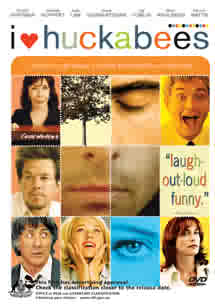
Diagnosis: Transference
This film is particularly recommended for those patients who suffer from existential-type concerns, including though not limited to: the nature of reality, the interconnectedness of all things, meaninglessness, and the world's petroleum crisis.
Patients who are frustrated with living life on its surface will find this film to be of great cathartic value. Often patients exhibiting existential angst find that they feel isolated from those around them, especially when trying to discuss their concerns. This film provides such patients with a voice, as well as a well-spring of empathetic characters. This film does anything but belittle these sorts of concerns.
Unfortunately, it is the nature of existential concerns that often patients suffering from them fail to recognize their own symptoms. This is very much like patients who suffer chronic yet mild intestinal discomfort for years, never realizing that they are harboring an insidious case of colo-rectal cancer. Potential patients are advised to refer to the following checklist as a means of assessing their personal risk:
Do you have lingering thoughts and/or concerns regarding the coincidences in your life?
Are you inexplicably sad when the coworker you most hate doesn't come in to work?
Do you ever seriously wonder what happens in a meadow at dusk?
Have you ever watched a group of shopper rummaging through a clearance bin and felt vaguely nauseated by their zeal for ever-cheaper bed linens?
Are you torn between your role as a business professional and your desire to be an interesting person?
If you answered "yes" to any of these items, it is advised that you watch this film as a precautionary measure. If you answered "yes" to three or more of these items, purchase this film immediately and begin a weekly dosage.
Prognosis: * * * * *
Not only is this film worth watching, it borders on becoming a new class of psychological vitamin. This film ought to be watched and digested at least once a quarter, re-invigorating the body's immune system against the shallowness of daily life. Under no circumstances should this film be watched with disinterest.
Analysis of this film should be considered a moral imperative. While watching this film is both entertaining and enjoyable, it ought to leave an intellectual aftertaste that deserves investigation. Immediately after watching this film, patients ought to reflect on the many issues presented in the film and apply them to their own cases. These applications can include, though are not limited to:
Increasing outdoor time and engaging in nature appreciation
Engaging in protests on any issues
Experiencing a sense of interconnectedness with a drunkard in Berlin who has recently lost his wife and job
Purchasing a large, red, rubber ball with handle
It must be noted that these are merely suggestions. Any applications of this film to individual cases will prove beneficial.
Synopsis
"Don't call it the ball thing. Call it 'pure being.'"
The Jaffe & Jaffe Existential Detective Agency makes it its business to expand its clients' understanding of the universe through spying and unfettered access. As Vivian Jaffe (Lily Tomlin) warns, it can often be quite upsetting to alter one's perception of reality, advising that only those who truly want to dismantle their existence ought become clients. Alfred (Jason Schwartzman) and Tommy (Marky Mark) are two such clients. Both men are deeply concerned with the preservation of the Earth, Albert through his work with the Open Spaces Coalition and Tommy through his unwaivering and explosive diatribes on the dangers of petroleum usage.
Although Alfred hires Jaffe & Jaffe to explain a series of coincidental meetings with a Sudanese refuge who collect autographs, the meat of Albert's case revolves around his association with a Huckabees Department Stores sales executive named Brad (Jude Law). Brad is the epitome of the phony businessman, all charm and zero substance, and he hires the existential detectives as a ploy to unnerve Albert and create dissention within the Open Spaces. All of these interconnections of characters are concocted in a gala event, sponsored by Huckabees, where Shania Twain will sing to benefit the local marsh and woods.
If the events here described seem inconsequential or silly, it is only because the actual tasks of these characters, as regards their professional lives, are incidental to the real substance of the film. Albert's being ejected from his own Open Spaces charter takes a backseat to his realization that both the Sudanese refuge and he were emotionally orphaned, one by civil war and the other by indifference. Brad's successful ploy to give Huckabees eco-friendly press while opening a mini-mall on the marshlands goes virtually unmentioned when compared to the attention given to his realization that he is all smoke and mirrors, adopting the mantra "How am I not myself?" until it literally makes him sick.
How does it end, you ask? The way all existential fiction must end. With the acceptance that existence is a constant cycle of the suffering of daily life, with all its petty concerns and worries, and the comfort of pure being, knowing that we are connected to all things and so need not worry about anything.
Remember: There is no such thing as nothing. There is no remainder in the mathematics of infinity. There is only the blanket.